Africa University
Africa University is a "private, Pan-African and United Methodist-related institution." It has more than 1,200 students from 36 African countries.[1] It is located 17 km northwest of Mutare, Zimbabwe's fourth largest city. It grants bachelor's, master's and PhD degrees in various programs.
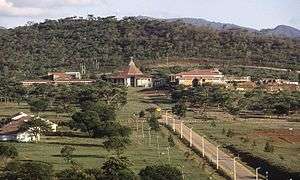 | |
| Motto | Investing in Africa's Future |
|---|---|
| Type | Private |
| Established | 1992 |
| Affiliation | United Methodist Church |
| Chancellor | Bishop David Kekumba Yemba |
| Vice-Chancellor | Professor. Munashe Furusa |
Administrative staff | 250 |
| Students | 1,300 |
| Location | Mutare (Old Mutare) , , |
| Campus | Rural, 1,545 acres (625 ha) |
| Nickname | Acacians |
| Sports | Rugby, swimming, soccer, field hockey, cricket, volleyball, basketball, lawn tennis, table tennis |
| Website | www |
History

Methodists have had a long history in Zimbabwe, formerly Southern Rhodesia. In 1896, Joseph Crane Hartzell was elected missionary bishop of Africa. In 1898 as Bishop Hartzell stood atop Mt. Chiremba overlooking Old Mutare (formerly Old Umtali), looking down into the valley below he envisioned hundreds of African youth with books in their hands running to school. Hartzell shared his vision with Cecil John Rhodes, the British imperialist. Rhodes then grants to Hartzell the former site of the Town of Mutare, including 13,000 acres (53 km2) for a Methodist Mission. The Old Mutare Mission is established and Hartzell's dream of training African teachers to educate Africa children takes root. That year, a primary school opened at Old Mutare Mission. The Mission now supports and manages Hartzell School, an institution for students in grades 1-13. Adjacent to the school are a small 60-bed hospital, an orphanage, and an agricultural program.
In 1984, two African bishops, with the support of thousands of African Methodists, issued the call to create Africa University. Bishop Emilio J. M. de Carvalho of Angola and Bishop Arthur F. Kulah of Liberia challenged their colleagues at the General Board of Higher Education and Ministry to support the establishment of a university in Africa. A committee then worked for nearly three years on feasibility studies and conversed with African church leaders about educational and vocational needs. A plan for the United Methodist-related university was presented to the General Board of Higher Education and Ministry in October 1987. Prompted by United Methodist plans to establish a continent-wide university in Zimbabwe where no private universities existed, President Robert Mugabe formed a government commission in 1987 to study the country's higher education needs and make recommendations about the role of private universities in the nation's overall education scheme.
At the 1988 General Conference, United Methodists overwhelmingly accepted the General Board of Higher Education and Ministry's proposal to begin the university. On 6 April 1991, thousands of people throughout Zimbabwe watched as the groundbreaking ceremony took place and one acacia tree was planted at the Old Mutare Mission site of Africa University. In January 1992, President Robert Mugabe granted Africa University's Charter by official proclamation. This is an African initiative, with African Methodists serving with United Methodists from all over the world to develop an institution for all of Africa.
Funding
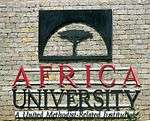
Funding for Africa University is a two-part $20 million effort every four years. Ten million is apportioned to the 34,000+ United Methodist churches. The apportioned dollars provide for the day-to-day operating expenses of the university. The second ten million is raised through World Service Special Gifts for a permanent endowment. The interest and earnings on the permanent endowment provide for scholarships and other financial aid for students as well as meet new and emerging programmatic needs of the university.
The Africa University Development Office located in Nashville, Tennessee,[2] has primary responsibility for raising the funds for the permanent endowment as well as for capital projects. James H. Salley is the Associate Vice-Chancellor for Institutional Advancement and has supervisory responsibility for the Nashville office.
Structure
A 30-member board of directors governs Africa University. The board is chaired by Bishop Marcus Matthews.A founding member of Africa University's Faculty of Theology was elected the university's third chancellor on 8 December 2008. Professor Fanuel Tagwira, another founding member of the university's Faculty of Agriculture, was elected the university's third vice-chancellor in March 2009. As of 1 July 2014, Prof Munashe Furusa was unanimously elected as the new vice-chancellor.
Africa University is the first private, fully accredited, degree-granting United Methodist-related institution of higher learning on the continent of Africa as established and approved by General Conference. The university is Pan-African in design and spirit. Thirty six nations of Africa were represented in the student population for the 2015/2016 academic year. The majority of faculty and administrative staff are Africans. Professors and policy makers comprise permanent and visiting educators from the United States, Europe, and around the world. The official language at the university is English, which is also the official language of Zimbabwe.
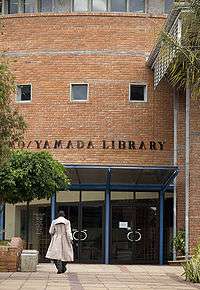
There are thirty-two buildings on the campus with four currently under construction. The 32 buildings include 12 dormitories, 12 senior staff housing units, a chapel, and a state-of-the-art library complex. The four buildings under construction include a student clinic, two housing duplexes for senior staff, and the building for the Institute of Peace, Leadership, and Governance (IPLG).
Recently the Kent M. Weeks Archives[3] was opened to collect all university and United Methodist Church records which are deemed to be of historic and research value.
The Kent M. Weeks Archives[4] is an entity of the Jokomo/Yamada Library. It is located on the second floor of the Jokomo/Yamada Library. The Archives was set up in honour of Dr. Kent M. Weeks for his invaluable contributions to the development of Africa University. He is also responsible for personally raising the funds for the establishment of the Archives. Although the Archives are housed within the Jokomo/Yamada Library they are an autonomous unit within a larger library system. The Kent Weeks Archives maintains its own mission statement, goals and objectives.
Academics
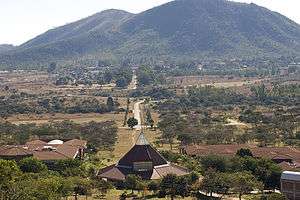
There are currently 3 schools at Africa University, namely the College of Health, Agriculture and Natural Sciences; the College of Business, Peace, Leadership and Governance; and the College of Social Sciences, Theology, Humanities and Education.[5] There is also the Africa University Information Technology Training Center.[6]
College of Health, Agriculture and Natural Sciences
- Agriculture & Natural Resources[7]
- Health Sciences[8]
The Department of Agriculture and Natural Sciences offers a Bachelor of Science and Master of Science degrees in Agriculture and Natural Resources.
The Department of Health Sciences offers undergraduate degrees in nursing and health science management and a master's degree in public health.
College of Business, Peace, Leadership and Governance
- Business[9]
- Computer Science and Information Systems
- Institute of Peace, Leadership and Governance
The Department of Business offers a number of training options for those interested in careers in business development and management, marketing, finance, and administration. At the undergraduate level, it has a full-time 4-year programme leading to degrees in accounting, economics, and management, marketing and computer science. It offers a full-time 2-year MBA program and a part-time EMBA program for senior managers and administrators.
The Institute of Peace, Leadership and Governance (IPLG) is a graduate institute which offers master's degrees in peace and governance, public policy and governance, Human rights law, Migration law and a Masters in intellectual property law. It also offers a PhD in Peace Leadership and Governance. It also offers trainings and short courses for lawyers, civil servants and policy makers. It has various partners including World Intellectual property organization (WIPO) and the Open Society Initiative in Southern Africa (OSISA)
College of Social Sciences, Theology, Humanities and Education
The Departments of Humanities and Social Sciences offer three- and four-year full-time degree programs, in the form of either a Bachelor of Arts or Bachelor of Social Sciences with specialisation in English, Environmental Studies, French, History, Music, Portuguese, Psychology, Sociology, or Religious Studies. Two master's degrees are offered in child and family studies.
The Department of Theology offers a four-year full-time Bachelor of Divinity degree and a two-year full-time Master of Theological Studies degree.
The Department of Education offers a four-year full-time Bachelor of Arts degree and a two-year Bachelor of Education degree for secondary school teachers. The two-year program is specifically designed for teaching professionals who wish to upgrade their skills.
Diversity: The AU “Difference”
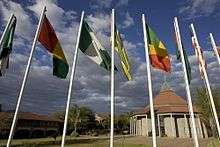
Africa University is a Pan-African institution committed to a diverse student population. Thirty six of the 55 nations of Africa are represented in the student body for the 2017/2018 academic year. Being both a pan-African and a Zimbabwean university, every year it strives to enrol up to 50% Zimbabwean students and the rest from Africa.
Approximately 52% of the student body are women.
Although the university is United Methodist-related, students are members of various Christian denominations and other religions including traditional African.
References
- "Welcome to Africa University Main Page". Africau.edu. 28 June 2010. Archived from the original on 19 August 2010. Retrieved 5 September 2010.
- "Africa University Development Office". Support Africa University. 23 July 2010. Archived from the original on 17 October 2010. Retrieved 5 September 2010.
- "Africa University Archives". Africauarchives.synthasite.com. Retrieved 5 September 2010.
- "Africa University Archives". Africauarchives.synthasite.com. Retrieved 5 September 2010.
- "Institute of Peace Leadership and Governance". Africau.edu. 23 August 2007. Archived from the original on 16 November 2009. Retrieved 5 September 2010.
- "Information Technology Training Center". Africau.edu. 26 November 2007. Archived from the original on 26 January 2010. Retrieved 5 September 2010.
- "Africa University::Agriculture". Africau.edu. 24 August 2007. Archived from the original on 24 August 2010. Retrieved 5 September 2010.
- "Faculty of Health Sciences". Africau.edu. 24 August 2007. Archived from the original on 25 August 2010. Retrieved 5 September 2010.
- "Management & Administration". Africau.edu. 11 February 2009. Archived from the original on 18 June 2009. Retrieved 5 September 2010.
- "Africa University :Administration". Africau.edu. 11 February 2009. Archived from the original on 11 January 2010. Retrieved 5 September 2010.
- "Faculty of Theology". Africau.edu. 11 February 2009. Archived from the original on 26 July 2010. Retrieved 5 September 2010.
- "Africa University Faculty of Education". Africau.edu. 24 August 2007. Archived from the original on 22 August 2010. Retrieved 5 September 2010.
External links
| Wikimedia Commons has media related to Africa University (Zimbabwe). |